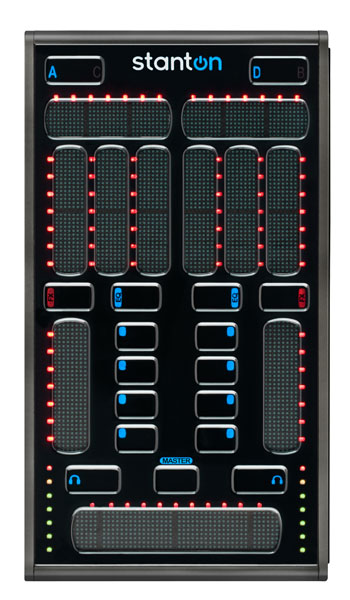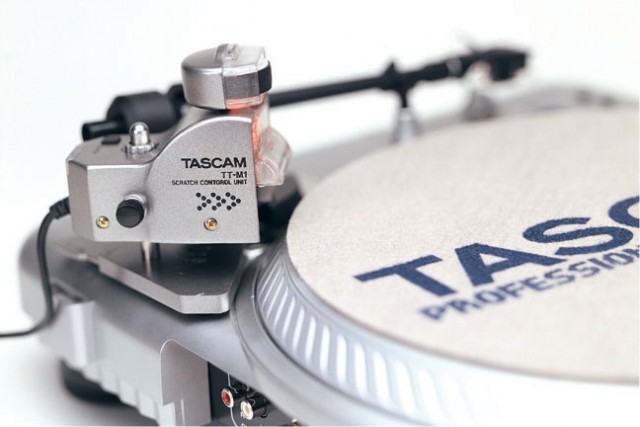Scratching, meet recycling. Rather than allow MIDI DJ controllers to consign themselves to landfills, a new open source project promises to retrofit these gadgets with scratch capabilities.
Scratch Decoder is a collaborative, open source effort to add or extend obsolete controllers, CDJs, and turntables with digital vinyl control – before they get tossed. Inspired by a 2009 thesis by Swiss student Ramon Mathis, advised by the folks who first developed the Ms. Pinky vinyl control system for Max/MSP, and rooted in years of work, the system is now publicly documented.
The ingredients:
An Arduino hardware board
The encoder sensor and board on a Numark CDX – which this project actually hacks into
MIDI, and Ms. Pinky’s software library
Upshot: add a computer, and you can translate scratch movements to MIDI messages for use with your DJ software of choice.
The video is in Spanish, so Mudo, who’s on the team, explains:
In the video, Norbert shows, as proof-of-concept, hijacking the encoder signal and connecting it to the digital inputs at Arduino. Then he sets up the software involved (serial-to-MIDI translator and Traktor controller panel) and starts the platter of the Numark CDX (the CDX is a CDJ without the ability to send MIDI from the platter) — all without a timecode CD, of course. It is not perfect right now, but it works at last.
I actually kind of like that it isn’t perfect.
This deserves further explanation for those for whom this isn’t obvious (mainly, most normal people). Typically, digital vinyl works by including a disc (vinyl or CD) encoded with timecode. That way, by looking at the audio playback from the device, as someone moves the record, the audio stream can be decoded in order to tell that, say, they’re scratching the disc.
In this case, a device that lacks that timecode disc and has sensors that refuse to see MIDI can be retrofitted to provide signal to software.
The team in this case is inspired by other experimental turntablists, artists who explore the potential of modifying technology for use in turntable performance technique. The project says it draws from the artistic ideas of these inventors as well as their technological research, looking to the likes of DJ Sniff, Jason Sadural and the Rastieri Project, Aaron Faulstitch, Jesse Kriss, and Scott Wardle.
I’m finishing editing a video interview with DJ Sniff showing of his current rig, but I asked Sniff, aka Takuro Mizuta Lippit, about this project. He points CDM to a range of “hackable gems,” devices for DJing that failed in the consumer market but are now available for creative use in used form.
Examples:
The Tascam TT-M1 is, says Taku “essentially just an optical encoder that rides that spinning platter.” It’s the sensor you can add to something like the CDX – a non-open equivalent of the project above, meant to rescue your CDX from the trash heap.

The Stanton SCS.3M brought to bear a fascinating array of interactive touch strips, a compact, all-touch controller for DJing. It’s a device we covered on CDM when it came out, particularly due to its similarity to [warning: getting obscure] the never-released M-Audio [then Midiman] Surface One controller prototype. The SCS got further than the M-Audio piece in that it was manufactured, but apparently has since been discontinued and didn’t quite take the market by storm. [Fair warning: I don’t see confirmation from Stanton that it’s discontinued, so its status may simply be, “not the biggest controller ever to hit the market” until we hear otherwise.]
Taku uses that gadget in his work, which you’ll see in the video soon.
In the meantime, to follow these community projects, there are some interesting discussions and sites coming together.
En Español and in English:
Proyecto 1: Scratch Decoder. Convierte tu viejo equipo en un controlador midi para scratch!
Discussion on the DJ TechTools forum of this project:
Which controllers with motorized platter does Traktor support? [a slight misnomer in the subject header – eventually, you wind up with the project here!]
See Ramón Mathis’ dream of an open community for sharing scratch skills, styles, and “tricks” via an interactive e-learning system and community:
http://www.skrat.ch/
